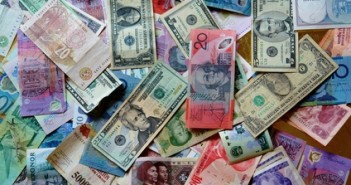Asian indices, with the exception of the Sensex, tumbled overnight to end the first month of 2014 facing pressure from emerging markets, fears over credit conditions in China and the Fed’s decision to taper on Wednesday.
In fundamental data from Japan, December core consumer prices gained 1.3% from a year earlier, its fastest pace in over five years, showing that Japan is making progress against deflation. This improved data suggests that it alleviates pressure from the Bank of Japan to ease until Spring / early summer when the new sales tax is expected to be implemented.
European stocks followed its Asian counterparts and extended losses as well on the back of euro-zone inflation data. Inflation data was mixed with core inflation edging up a tick to 0.8% while on a monthly basis for the month of January; it unexpectedly fell to 0.7%, below analysts’ estimates of 0.9%. This marks the fourth consecutive month where the print was below 1% and with unemployment remaining elevated in the euro zone at 12.0%, coupled with price pressures, it could push the European Central Bank to embark of further easing measures in the next six months.
It is speculated that the ECB in its next meeting on February 6 could cut its main refinancing rate by 15 basis points, which would lower the key lending rate to an all time low of 0.1% and reduce its deposit rate by 10 basis, which would push it into negative territory for the first time in euro-zone history. Other tools that the ECB may consider to employ include a similar scheme as the UK’s Funding for Lending scheme or another round of LTROs.
The euro failed to find support with rising core inflation with the pair of EUR/USD currently trading at 1.3525 area, after touching a low of 1.3517. On a technical basis, a daily close below 1.3517 could pave the way to test 1.3508, followed by 1.3490. Resistance for EUR/USD is located at 1.3595, 1.3603 and 1.3614.
In the UK, consumer confidence posted a strong recovery following three consecutive months of declines. The UK Consumer Confidence Index improved from -13 to -7 in January, its best reading since September 2007. The improvement can be attributed to the recovery in the housing and consumer sectors which has lifted the economy. GBP/USD is trading at 1.6476 area, flat on the day, looking to aim at 1.6522 which would then expose 1.6563 and 1.6605. Support, on the other hand is seen at 1.6398, 1.6357 and 1.6316.
Heading into the North American session, Canadian GDP date for November came in line with consensus at 0.2%, lower than October’s print of 0.3%. The recent softness of the loonies has been a combination of factors – bearish sentiment, relative monetary policy, emerging market concerns and technical. Recent correlations between CAD with oil and year-to-date gains on the TSX have also been ignored with the loonie trading most closely with interest rates. The release of Canadian GDP did little to support the Canadian dollar as it trades above the 1.1200 handle, targeting next level of resistance at 1.1226 and 1.1237. On the downside, support is found at 1.1103, 1.1078 and 1.1048.
South of the border, a slew of data is on tap for the US calendar. Personal spending for December saw a gain of 0.4%, better than the expected 0.3% and Personal Consumption Expenditures for the same month came in line with consensus at 1.1% on an annualized basis. We will see the release of January Chicago Purchasing Manager’s Index and Reuters/Michigan Consumer Sentiment Index later in the morning.
By Cheryl Girling, National Account Manager at Cambridge Mercantile Group
Further reading:Â Risk sentiment wanes as emerging markets remain in focus



